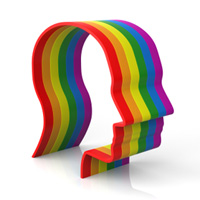On November 7, 2016, LGBTQ mental health help lines across the country saw a jump in calls. For many hotlines, call volumes have remained high ever since.
The month of May, which was Mental Health Awareness Month, served as a reminder that it is critical for us to continue our efforts to increase understanding of how the LGBTQ community is impacted by mental health challenges.
As we see it, these challenges are three-fold:
First: We live in a world where our community continues to face incredible backlash, pressures, and challenges.
Yes, we have achieved marriage equality and the end of “Don’t Ask, Don’t Tell,” but at the same time, dozens of states introduce anti-LGBTQ legislation every year, and incidents of violence and threats against our community are on the rise.
Second: The mental health field as a whole has been woefully slow to recognize the psychological stress and impact this has on us as individuals and as a community.
While we have certainly come a long way since the American Psychiatric Association’s (APA’s) Diagnostic and Statistical Manual of Mental Disorders listed homosexuality as a “sociopathic personality disturbance,” and transgender and gender non-conforming identities as experiencing “gender identity disorder,” there is still progress to be made.
LGBTQ individuals are almost 3 times more likely to experience mental health issues such as depression or anxiety, according to the National Alliance on Mental Health, yet many mental health providers receive no training in addressing the challenges unique to our community.
Third: the LGBTQ community has been reluctant to openly discuss the depression and anxiety that plague so many of us. The stigma, on so many levels, is enormous.
Some of us hide our sexual orientation or our gender identities from our mental health providers for fear of being misunderstood, ridiculed, or rejected.
At the same time, we also often hide our mental health conditions from our LGBTQ friends and family.
Both are rational and justifiable responses to widespread bias and prejudice—but both actions markedly undermine our ability to overcome mental health issues and get healthy.
Yet, as I travel throughout our region, I see promising signs that these problematic trends are shifting.
The anti-LGBTQ rhetoric in Washington DC and in some state capitals has our community working together with renewed purpose and determination, making gains that only a decade ago seemed impossible.
I see and hear many in our community openly sharing their distress in response to the epidemic of suicides that we are experiencing across the region. A growing number of mental health lines for our community have been established to meet this need.
I also see the mental health community rising to the challenge. From Boston to Seattle, there are increasing number of efforts to bridge the gap and both ensure the mental health community is equipped to serve the LGBTQ community and that the LGBTQ community is aware of the range of mental health resources available.
On June 14, we will further bridge this gap when, with support from Pride Foundation, Cardea will host a free webinar for mental health providers in the Northwest to help them understand how they can better engage with their LGBTQ clients.
“This training is one of the first of its kind and is a response to the situation we find ourselves in now,” said Ginny Cassidy-Brinn, Clinical Training Manager at Cardea. “The queer community is meeting increased levels of violence and discrimination which can exacerbate underlying mental health issues. In this environment, how can providers help people feel safe when, in the past, they’ve been mistreated?”
Luis Fernando Ramírez Limón, Executive Director of Entre Hermanos, explained that the hurdles for Latina/o/x LGBTQ individuals to obtain the mental healthcare they need is even greater, “There are cultural barriers that make going to a mental health professional quite challenging. And now, we are adding to these challenges the fact that many of our clients are undocumented and fear that they could be deported. This can put mental health assistance even further out of reach.” These issues will also be discussed as part of the webinar.
At Pride Foundation, when we say “Be Who You Are, Where You Are”—we mean it. Whether our stories are full of joy, anxiety, or pain, we must continue to share openly and honestly. Only then can we truly be there for one another and celebrate genuinely.
Gunner Scott is Director of Programs at Pride Foundation. For more information or to register for the Cardea Webinar, follow this link.
Additional Community Resources:
- Gay City LGBTQ Resources and Referrals: 206-323-5428
- M-F 11 am – 8 pm
- Sat 11 am – 5 pm
- Crisis Clinic: 866-427-4747
- 24-hour help line
- GLBT National Help Center
- National Hotline: 888-843-4564
- Sage LGBT Elder Hotline 888-234-7243
- Youth Talkline 800-246-7743
- Trans Lifeline
- 877-565-8860
- Seattle Counseling Service (206) 323-1768
- Entre Hermanos (206) 322-7700
- 10 am to 5 pm
